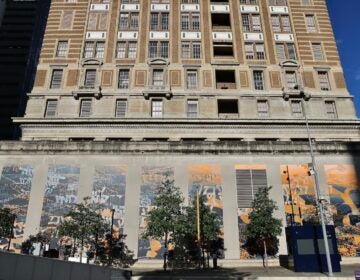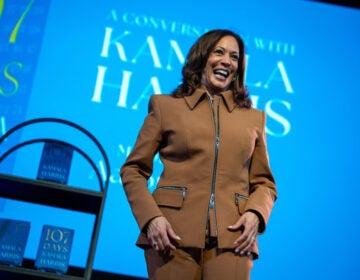Federal probe sought into Philly workers’ claims of racial discrimination by American Airlines

Airport workers allege that their white colleagues use padlocks - like the one on this tug's electrical cables - to disable the best equipment and reserve it for white workers' use. (Image courtesy of attorney Brian Mildenberg)
A group of Philadelphia airline employees is calling for a federal investigation into what it says is racial discrimination by American Airlines at Philadelphia International Airport.
The African-American and other minority workers claim they’re being denied the same job training and overtime as their white colleagues — while also getting stuck with the least safe equipment.
“It’s hard to believe, but I have 50 employees who all tell the same story,” along with 20 more in Washington, D.C., said attorney Brian Mildenberg, who represents the workers. He recently asked the federal Department of Justice open a formal investigation.
Mildenberg said that what began as a look into racial discrimination over training and assignments eventually expanded to include safety violations springing from poorly maintained equipment. Workers told him stories of racial slurs directed at minorities, and preferential treatment for whites.
Minority workers got the shoddiest equipment, he said, while white workers reserved the best for themselves.
“They told us that white employees were reserving the better tugs, the better trucks, and locking them up and disabling them so that only they could use them,” Mildenberg said. “So complaints were made to management. Nothing changed, nothing happened.”
And the lack of access to training hit minority workers directly in the wallet, he said. White workers routinely got the training needed for the best-paid assignments, while minorities were stuck working warehouse duty or other lower-skilled tasks with less overtime opportunities.
“Without the training for each particular job, you can’t qualify for that job,” Mildenberg said. “If you’re denied training, you’re denied the opportunity to work other jobs and get overtime.”
American Airlines, US Airways safety, racial discrimination lawsuit (PDF)
Investigations by the FAA and OSHA have already confirmed some of the safety violations. Mildenberg hopes the DOJ can substantiate the allegations of discrimination.
American Airlines officials acknowledged that some safety violations did occur, but said they’ve since been corrected. They denied the allegation of racial discrimination and promised a vigorous defense.
“Diversity and inclusion are fundamental to our airline,” they said in a written statement. “Ours is a diverse workforce serving customers who are equally diverse, and we are committed to fostering a work environment that is based on collaborative teamwork and mutual respect.
“We will vigorously defend our company and the hard-working employees who provide top-quality service to our customers each and every day.”
A ‘balkanized’ industry
But the head of the Philadelphia Commission on Human Relations said the workers’ allegations were “serious” and deserve the closest scrutiny.
“Whether it’s a matter of perception or reality, both the workers and the airline’s leaders deserve and need to get to the bottom of these concerns and find a resolution, for the health of the workplace, consumers and shareholders alike,” wrote Rue Landau, commission director, in a statement.
The fact that tensions on the tarmac are running high didn’t surprise Peter Cappelli, a professor at the Wharton School of Business who has followed the airline industry for decades.
Airlines don’t have any racial issues that can’t be found in other businesses, he said, but they do have what he called a “balkanized” working environment which can exacerbate whatever tensions may arise.
“I’ve never head of particular racial problems in airlines that are worse than in other industries,” Cappelli said. “But I think the idea that the management and workers in airlines can be unusually separated from each other probably makes it a little easier to get this us-vs-them context than you might see elsewhere.”
Airlines are governed by a complex set of regulations, he said, and their workforces are split into factions that don’t always get along. Pilots and crew, mechanics and baggage handlers, food service and maintenance workers, and of course management itself — each has its own agenda and needs, he said.
“You’ve got these different groups that physically often don’t come into a lot of contact, each represented by different unions, and all in competition with each other for deals from management,” Cappelli said. “It’s a little harder to get the workers together to solve mutual problems … just getting them all in the room together is almost impossible to do.”
Add to this the constant pressure from management to cut costs, and workplace tensions of any kind can easily get out of hand, he said.
Mildenberg agreed. “It’s not just the airline industry — if you Google any industry, you’re going to find a history of racial discrimination complaints,” he said. “It’s part of the history of our country … we’re developing our society toward a more positive direction, but we’re still dealing with those ghosts of the past.”
And while there’s no response yet from the DOJ, his hope is that the agency will eventually appoint an independent monitor to prevent future discrimination. And his clients, he said, just want the same chances to advance as their colleagues. “They want equal opportunity for equal work,” he said.
//
American Airlines, US Airways safety, racial discrimination lawsuit (Text)
A group of Philadelphia airline employees is calling for a federal investigation into what it says is racial discrimination by American Airlines at Philadelphia International Airport. The African American and other minority workers say they’re being denied the same job training and overtime as their white colleagues — while also getting stuck with the least safe equipment. “It’s hard to believe, but I have fifty employees who all tell the same story,” along with twenty more in Washington, DC, said attorney Brian Mildenberg, who represents the workers and recently requested that the federal Department of Justice open a formal investigation. Mildenberg said that what began as a look into racial discrimination over training and assignments eventually expanded to include safety violations springing from poorly maintained equipment. Workers told him stories of racial slurs directed at minorities, and preferential treatment for whites. Minority workers got the shoddiest equipment, he said, while white workers reserved the best for themselves. “They told us that white employees were reserving the better tugs, the better trucks, and locking them up and disabling them so that only they could use them,” Mildenberg said. “So complaints were made to management. Nothing changed, nothing happened.” And the lack of access to training hit minority workers directly in the wallet, he said. White workers routinely got access to the training needed for the best-paid assignments, while minorities were stuck working warehouse duty or other lower-skilled tasks with less overtime opportunities. “Without the training for each particular job, you can’t qualify for that job,” Mildenberg said. “If you’re denied training, you’re denied the opportunity to work other jobs and get overtime.” (The complete complaint can be seen here: http://www.lawyerairline.com/american-airlines-us-airways-safety-racial-discrimination-case ) Investigations by the FAA and OSHA have already confirmed some of the safety violations. Mildenberg hopes the DOJ can substantiate the allegations of discrimination. American Airlines officials acknowledged that some safety violations did occur, but said they’ve since been corrected. They denied the allegation of racial discrimination and promised a vigorous defense. “Diversity and inclusion are fundamental to our airline,” they said in a written statement. “Ours is a diverse workforce serving customers who are equally diverse, and we are committed to fostering a work environment that is based on collaborative teamwork and mutual respect. We will vigorously defend our company and the hard-working employees who provide top-quality service to our customers each and every day.” A “Balkanized” Industry But the head of the Philadelphia Commission on Human Relations said the workers’ allegations were “serious” and deserve the closest scrutiny. “Whether it’s a matter of perception or reality, both the workers and the airline’s leaders deserve and need to get to the bottom of these concerns and find a resolution, for the health of the workplace, consumers and shareholders alike,” wrote Rue Landau, the Commission’s director, in a statement. And the fact that tensions on the tarmac are running high didn’t surprise Peter Cappelli, a professor at the Wharton School of Business who has followed the airline industry for decades. Airlines don’t have any racial issues that can’t be found in other businesses, he said, but they do have a what he called a “balkanized” working environment which can exacerbate whatever tensions may arise. “I’ve never head of particular racial problems in airlines that are worse than in other industries,” Capelli said. “But I think the idea that the management and workers in airlines can be unusually separated from each other probably makes it a little easier to get this us-vs-them context than you might see elsewhere.” Airlines are governed by a complex set of regulations, he said, and their workforces are split into factions that don’t always get along. Pilots and crew, mechanics and baggage handlers, food service and maintenance workers, and of course management itself – each has its own agenda and needs, he said. “You’ve got these different groups that physically often don’t come into a lot of contact, each represented by different unions, and all in competition with each other for deals from management,” Cappelli said. “It’s a little harder to get the workers together to solve mutual problems … just getting them all in the room together is almost impossible to do.” Add to this the constant pressure from management to cut costs, and workplace tensions of any kind can easily get out of hand, he said. Mildenberg agrees. “It’s not just the airline industry – if you Google any industry, you’re going to find a history of racial discrimination complaints,” he said. “It’s part of the history of our country … we’re developing our society towards a more positive direction but we’re still dealing with those ghosts of the past.” And while there’s no response yet from the DOJ, his hope is that the agency will eventually appoint an independent monitor to prevent future discrimination. And his clients, he said, just want the same chances advance as their colleagues: “They want equal opportunity for equal work.”
WHYY is your source for fact-based, in-depth journalism and information. As a nonprofit organization, we rely on financial support from readers like you. Please give today.




